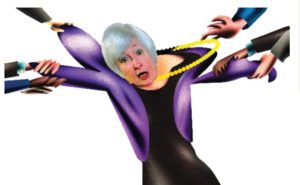In the current election cycle, Federal Reserve Chair Janet Yellen has been accused of inflating “a big, fat, ugly bubble” by keeping interest rates too low. Yellen couldn’t just shrug off the accusation, because only five days earlier three members of her own rate-setting group, the Federal Open Market Committee, had expressed the same idea in more delicate language. Loretta Mester, Esther George, and Eric Rosengren dissented from the FOMC decision to stand pat on rates, the committee announced, because they “preferred” to raise the federal funds rate a quarter percentage point at the meeting.
It isn’t easy running a central bank, especially during an election campaign, and even more so during this campaign, when there’s a deep division within the economics profession over whether U.S. interest rates are too low. As the uneven record of central banking goes to show, setting interest rates is a bewildering business. But exposing that bewilderment to the public makes the Fed seem ineffective, which renders it more vulnerable to attack.
The difficulty for Yellen is that although the Fed’s motivations aren’t political, its actions are inherently political in the sense that they affect the economy and thus create winners and losers. Keeping interest rates low helps incumbents by stimulating growth—but at the risk, some say, of generating unacceptably high inflation that would have to be quelled with high rates later.
Raising rates now presents its own difficulties. It could disrupt financial markets, shaking confidence. The next meeting of the FOMC concludes on Nov. 2. As of Sept. 28, financial markets saw only a 17 percent chance that the Fed would raise rates on that date, vs. a 53 percent chance of raising rates on Dec. 14. Why the low expectations for November? One reason is that there’s no press conference scheduled then, and Yellen uses press conferences to explain rate moves. But another reason is that markets don’t seem to think the Fed will call attention to itself by hiking rates six days before the election. Of course, not hiking could itself be read as a political decision.
The point is that anything the Fed does or doesn’t do is viewed through a political filter, even though Yellen said after the Sept. 21 FOMC meeting that “we do not discuss politics at our meetings, and we do not take politics into account in our decisions.”
Yellen is putting the best face on Fed dissent. She told reporters she thinks “it’s a very good thing that the FOMC is not a body that suffers from group-think.”
The deeper problem for the Fed is that its underregulation before the financial crisis and its overoptimism about the recovery have dulled its aura of expertise, says Robert Johnson, president of the Institute for New Economic Thinking.

